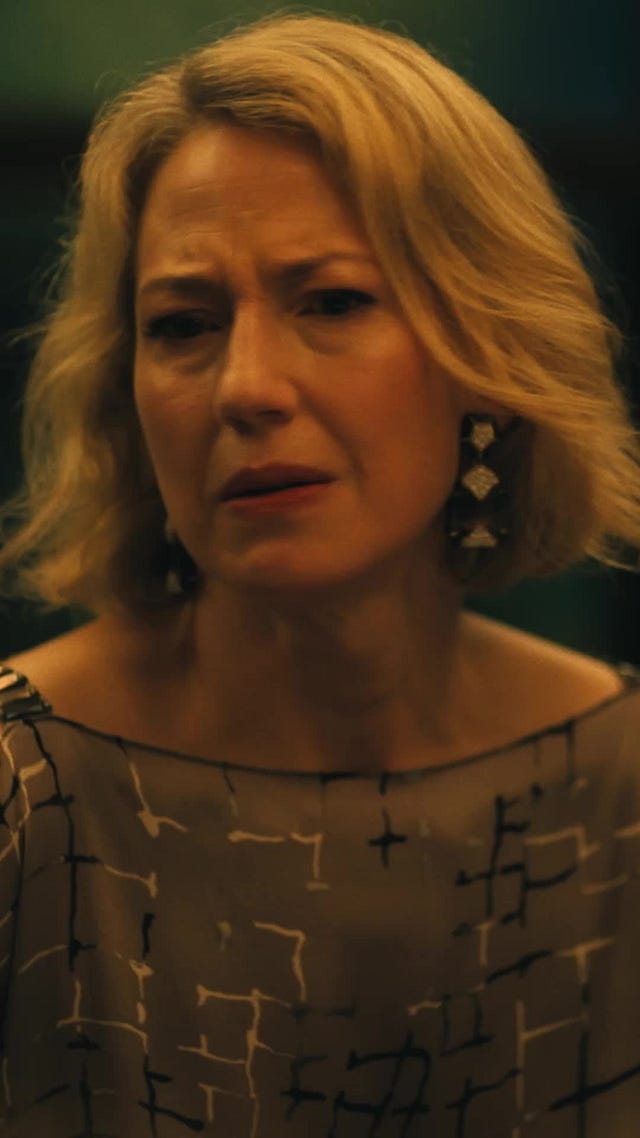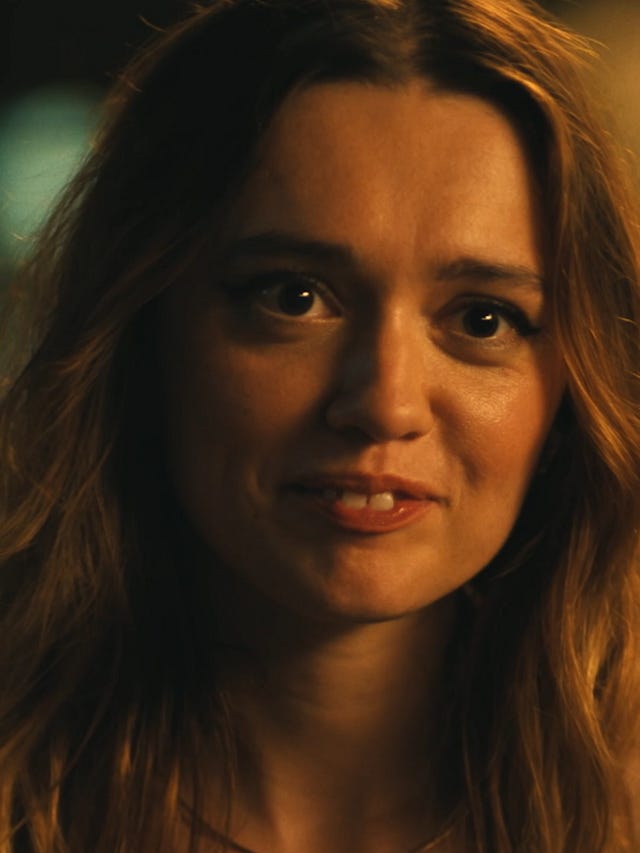White Lotus season three is all about belief systems. Everyone at that hotel in Thailand has either put their faith in something or is seeking something to put their faith in. Some of them succeed in their quest, some lose their faith in their higher power, and some have their faith restored—all via ethically and morally ambiguous methods. Laurie’s speech at the end of the finale episode sums this up best for me:
But this season wasn’t about Laurie and her problematic friends. At least, not for me. It was about Rick and Chelsea.
Rick Hatchett, played by Walton Goggins, is a wealthy, chronically unhappy man. He arrives in Thailand with his much younger and much more optimistic girlfriend, Chelsea, played by Aimee Lou Wood, in tow. Rick is on a mission: to find and kill the man he believes killed his father before he was born, which left him with a junkie mother who died when he was ten, thus ruining the rest of Rick’s life.
Rick is a man completely ruled by his trauma. As Wood so aptly puts it in an interview: “He’s made his pain his God,” or his belief system. He wears it on his sleeve, his other sleeve, the front of his shirt, his pants, his face—it’s him. Chelsea, though, “made the relationship her God.” Winning Rick’s love and making him happy is her entire belief system; it motivates her and colors everything she does.
Chelsea loves astrology and Buddhist philosophy and books about meditating. She’s an open heart who draws people to her, and when they get close she lets them in without question. She is a great listener and an excellent judge of character, which is why her relationship with Rick is so frustrating for viewers—how can she see through Saxon Ratliff’s bullshit so easily but can’t see that Rick treats her like shit?
But she isn’t completely oblivious. She reveals her frustrations with Rick in her conversations with other people. “He’s like my child,” she tells Chloe, “It’s always about his feelings and his mood and his pain. You know, I have pain too.” We never get to learn about Chelsea’s pain, though. She gets the classic tragic heroine treatment: we only see her through the eyes of her men. There are hints about her depth and her past, but we don’t even know her last name.
While the rest of us see a woman trapped in a toxic relationship, Wood sees a woman with agency on a self-destructive path and an addiction to love. “She has such a strong unconscious drive and she can’t save herself,” Wood explains, “She is very, very tenacious, if she’d channeled her tenacity in a different direction, she could have taken over the world.” But like so many heroine’s before her, she channelled that tenacity into an un-tenacious man.
Rick and Chelsea are on the same mission. Chelsea states it plainly: “We’re in a battle and I’m hope and he’s pain, and eventually one of us will win.” But Rick is so focused on the locus of his pain—the man he thinks killed his father—that he can’t see Chelsea plainly. He thinks that if he gets his revenge, he can finally be done with his pain forever and move on.
Thailand is a buddhist country, so we’re forced to look at the characters of the show and the conflicts they face through that philosophical lens. “You cannot outrun pain,” a Buddhist monk tells hopeful disciples, easily summarizing the larger theme of the show. Rick is trying to outrun his pain because to experience his feelings of grief, shame, loneliness, what have you, is far too painful. He’s spent so long convincing himself that what happened to him ruined his life that now he’s letting it. That would be tragic enough if it were just him, but he’s ruining Chelsea’s life too.
Walton Goggins understands this acutely, because at one point in his life, he was Rick. He went to South Asia some 20 years ago seeking healing from a traumatic loss of his own: the suicide of his first wife. “I was a year into a relationship with my now-wife, and I was as lost as Rick is lost,” he tells Vulture. “I had nothing for my partner. I understood, intimately, Rick’s frame of mind.”
“Rick Hatchett is not a fictional character to me. He’s a real person consumed by something that happened to him that he had no control over,” he says. In order for Goggins to get past his trauma, he says he had to learn to love himself:
“What has brought me an extraordinary amount of peace in my life is when I finally fell in love with myself. Genuinely, I think that is the path of all spirituality. You can say it’s about finding God, but when you find your god, you’re still going to have to face yourself.”
Once he did that, he could forgive himself and the people who hurt him. He applied this philosophy to his portrayal of Rick:
“It was like, This is it. Just forgive yourself. Forgive your circumstances. Forgive the people that fucking were doing their best, and just be okay with it. You don’t have to be anything other than what you are, and you’re enough, man. If you can love you, then you can love anybody. Those were lessons I learned 15 years before this experience, and they were hard-won. Reading the scripts, I felt like this guy will realize it too late.”
Rick, of course, does realize it too late. It’s not until Chelsea is dying in his arms, bleeding out from a gunshot sustained in a shootout he started, that he realizes what he’s lost. But right before the shootout that ultimately ends both of their lives, Rick was feeling better. He’d been to Bangkok to confront his enemy and what he found was a weak old man, not the supervillain he’d been picturing his whole life. He walked away without his revenge, and returned to Chelsea a happier, better version of himself. “I got the monkey off my back,” he told her, beaming.
But the new Rick only lasts for a few hours before his enemy shows up at the hotel, pushing Rick into his pain again. He shrinks before Chelsea’s eyes and reverts to the tortured creature he’s always been. He returns to his old script about how his life was doomed from the start because he never felt loved by the people who should have loved him most. “Stop worrying about the love you didn’t get,” Chelsea pleads. “Think about the love you have. I love you. I’m right here.”
I’ve been Chelsea, so I speak from experience when I tell you what you probably already know: love isn’t enough. If a love as pure and unconditional as Chelsea’s was enough to heal Rick from his childhood trauma, they would have never needed to go to Thailand in the first place. The unfortunate reality of healing from trauma as complex as Rick’s is that other people are victimized in the process.
But Chelsea chose her fate. “Chelsea thinks fate is external, but it’s internal,” says Wood. “It’s her stuff that she hasn’t faced. It’s her unhealed shit. It’s not big forces outside of her pushing her to Rick; it’s big forces inside of her pushing her to Rick. But she doesn’t look inside.”
For someone so interested in astrology and healing, who possesses all the language of a self-aware person, Chelsea is hiding just as much as Rick. It’s actually Saxon, the toxic boy who would be king, who really sees her. She rebuffs his advances and pushes her woo-woo books on him, urging him to heal himself the way she’s trying to heal Rick, and he accepts them with eagerness and curiosity. “It’s: don’t look at me, look at this,” Wood says. “Do you think that if she’d said to Rick, ‘I need you to read this book for me,’ he would have done it?…It’s never going to be read. But Saxon takes it, and he reads it.”
It’s the tragedy of being a Chelsea that the best parts of you are terrifying when reflected back at you. That’s why she can’t fathom being with someone as easy and willing as Saxon. If she didn’t have Rick to work on—if her partner accepted her help and healed himself—then what? What does she do with all that tenacity now? She’d have to turn it on herself; she’d have to forgive whoever hurt her before Rick, or forgive whatever situation pushed her into the arms of the gurus and the spiritual healers. She’d have to forgive herself and learn to love herself, like Goggins did.
It’s when you neglect that step that you become Rick. I’ve been a Chelsea for so long and used my tenacity all wrong, now I’m a Rick. It’s the bitterness that eats away at me now—the need, not for revenge in the literal sense, but for some kind of accountability. I want my enemies to stand on a pulpit in the town square and proclaim to everyone whose ever known me, “She was right and I was wrong. She is good and I am bad. Notice her. Love her. Do what I couldn’t. Take my place."
But even if that were to happen, I wouldn’t be satisfied. Rick’s satisfaction didn’t last, even after he spent his whole life searching for it. Without forgiveness, revenge isn’t sweet. The Buddhist monk said “You cannot outrun pain.” He also said “There is no resolution.”




Funny how religious we get about TV shows. In White Lotus someone gets killed in the final episode and we spend the week before guessing and debating who it will be and why. White Lotus has been a harbinger of unexpected drama and keeps me waiting, wanting that climax. The other show, where I knew the ending already was the MY BRILLIANT FRIEND series. I read the books twice but watched the series to see the constant tension between Lenu and Lila and how that compelled the books forward. Seeing the characters on the screen helped me realize the art of those novels. Frequently movies made from books miss the point of the nove and are too grandiose or interested in happy endings.